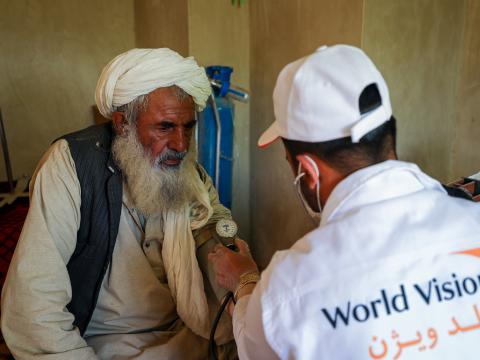Reaching the Most Remote with Health Services

"If I had not received health services immediately, I would have died," said Kola Khan, a resident of a remote village in Badghis province, a seven-hour drive from the province’s centre. He suffers from multiple health issues. "I have high blood pressure. When I speak, my blood pressure gets high, and when it is high, I can’t move and fall on the ground. I also have pain in my knees," he said, short of breath.

Kola Khan received life-saving health services in his village from World Vision Afghanistan’s ‘Emergency Life-saving Food Security Through CVA (cerebrovascular accidents) and Health/Nutrition Assistance to Drought and Conflict Affected Communities’ project, funded by the German Federal Foreign Office (GFFO). This project provides the most vulnerable people with primary health services in the hardest-to-reach Afghan villages. This project is implemented in two provinces and, to date, has provided health services to more than 3,800 of the most vulnerable people.
Kola Khan’s village has no health facilities, so people—especially children—suffer from even minor ailments. "The reason for many diseases in our village is a lack of clean water and, on the other hand, a lack of a health centre," Kola Khan said.
The only available health centre is a clinic in the centre of the district, a two-hour drive from the village. The roads are unpaved. If there are serious and urgent health issues, villagers pay up to 4,000 AFN [US$45] to rent a vehicle. This is unaffordable for many.
Kola Khan said, "Especially in winter, the problems are doubled. Due to heavy snow, [the road] gets blocked, and we are often disconnected from Murghab [the district centre]."

When someone is severely sick and cannot afford treatment, they can take out loans, but most residents are in similar financial condition and cannot lend their money. If a family is able to get loans, they must often sell their land to pay off the loans. The land is most villagers’ only source of income, "Those who can afford it will take their ill relative to the clinic in Murghab or Herat City. Those who cannot, they have to suffer and even die,” Kola Khan continued. "Many children lose their lives every year. The graveyard is full of new graves of children who did not receive health services.”
Afghanistan is facing the world’s worst humanitarian crisis. Thousands of villages and millions of people similar to Kola Khan before World Vision Afghanistan’s assistance do not have access to health services. The broad humanitarian crisis critically limits the capacity of the health system. As a result, 17.6 million people need health services, of which 4 million are suffering from malnutrition, including 875,000 children suffering from severe acute malnutrition (SAM).
World Vision Afghanistan actively contributes to improving the health and wellbeing of girls and boys across Afghanistan, including increasing nourishment, reducing life-threatening illnesses amongst children under five, detecting and treating malnourished children, and helping to ensure females of reproductive age are healthy, especially in the most hard-to-reach communities.
Through GFFO’s generosity, World Vision Afghanistan’s Mobile Health and Nutrition Team has provided Kola Khan’s village with health services since December 2022. The team offers nutrition, outpatient services, midwifery, nursing, mental health, and vaccination services. The team also conducts health promotion activities to raise awareness on health-related issues.
"But gratefully, since this team came here, our health problems are solved! We take our sick family member to this clinic—it doesn’t matter if it is day or night," Kola Khan acknowledged. "If had not received health services immediately, I would have already died."

"Our children and women receive good health care. My three grandchildren were malnourished, but after they took medicine and nutrition packages from here, their health has improved so much that one would not believe they are the same children,” said Kola Khan. “The team also gave me medicine for my blood pressure. It is very helpful. We are at ease and happy with this service and thank World Vision for establishing this clinic that solves our health problems. … We hope they support us permanently."